Simon Guerrier's Blog, page 26
March 1, 2023
In conversation with Fatima Manji
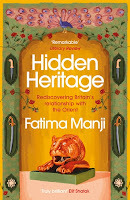 On Saturday 11 March, I'll be in conversation with award-winning author and broadcaster Fatima Manji about her book Hidden Heritage: Rediscovering Britain's relationship with the Orient, as part of Macfest.
On Saturday 11 March, I'll be in conversation with award-winning author and broadcaster Fatima Manji about her book Hidden Heritage: Rediscovering Britain's relationship with the Orient, as part of Macfest. This free event takes place online from 2 to 3.30 pm. For more details and to book tickets, see the Eventbrite listing for Hidden Heritage: A Fresh Persective. Blurb as follows:
Fatima Manji will be exploring and answering some of the following questions: Why was there a Turkish mosque adorning Britain’s most famous botanic garden in the eighteenth century? How did a pair of Persian-inscribed cannons end up in rural Wales? And who is the Moroccan man depicted in a long-forgotten portrait hanging in a west London stately home?
Throughout Britain’s museums, civic buildings and stately homes, relics can be found that reveal the diversity of pre-twentieth-century Britain and expose the misconceptions around modern immigration narratives.
In her journey across Britain exploring cultural landmarks, Fatima Manji searches for a richer and more honest story of a nation struggling with identity and the legacy of the empire.
‘A timely, brilliant and very brave book’ Jerry Brotton, author of This Orient Isle.
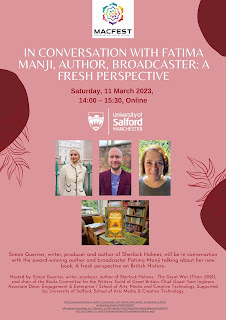
February 28, 2023
In conversation with Aamina Ahmad and Eli Lee
Last week I hosted an event for the Writers' Guild of Great Britain with the last two winners of our Best First Novel Award - Aamina Ahmad for The Return of Faraz Ali (Sceptre, 2022) and Eli Lee for A Strange and Brilliant Light (Quercus, 2021). You can see the full thing here:
February 26, 2023
Sirens of Audio #145
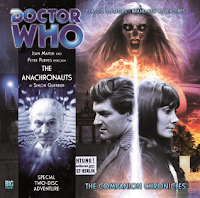 The latest Sirens of Audio video podcast features me being grilled about my 2012 Doctor Who audio story The Anachronauts, which starred Jean Marsh and Peter Purves, and was directed by Ken Bentley.
The latest Sirens of Audio video podcast features me being grilled about my 2012 Doctor Who audio story The Anachronauts, which starred Jean Marsh and Peter Purves, and was directed by Ken Bentley. What did the story owe to Tom Baker? Why did we need to worry about the Emmys? What was I even thinking? All this and more will be revealed...
You can buy Doctor Who and the Anachronauts from Big Finish.
February 23, 2023
Radio Free Skaro #893
 On Saturday, I spoke to Steven and Chris from Radio Free Skaro about my research into the life of David Whitaker. I'd just given my talk on Whitaker at the Gallifrey convention, and you might be able to detect the buzz of adrenaline.
On Saturday, I spoke to Steven and Chris from Radio Free Skaro about my research into the life of David Whitaker. I'd just given my talk on Whitaker at the Gallifrey convention, and you might be able to detect the buzz of adrenaline.NB that Radio Free Skaro recorded lots at the convention, including an insightful interview with Chris Chibnall that they'll share next week!
February 22, 2023
Vworp Vworp! #5
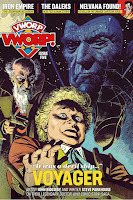 I've had a brilliant long weekend in Los Angeles as a guest at the Gallifrey One convention, catching up with lots of old pals, meeting people for the first time in person who I've corresponded or worked with for ages, and making lots of new friends. It's an extraordinary, engaging and friendly event, hard to describe to anyone who's not been there. So, moving on...
I've had a brilliant long weekend in Los Angeles as a guest at the Gallifrey One convention, catching up with lots of old pals, meeting people for the first time in person who I've corresponded or worked with for ages, and making lots of new friends. It's an extraordinary, engaging and friendly event, hard to describe to anyone who's not been there. So, moving on...Waiting for me at home was issue 5 of the excellent fanzine Vworp Vworp!, which includes my short piece, "Dalek December" on the 1965-66 stage play The Curse of the Daleks written by David Whitaker and Terry Nation, the focus being on whether it was any good. There are lots of other Whitaker-related goodies, not by me - and I gasped at the colourised photo.
I've now got to get back to writing my forthcoming biography of Whitaker, and a bunch of other stuff. Tomorrow I'm interviewing Eli Lee and Aamina Ahmad, the last two winners of the Writers' Guild of Great Britain's Best First Novel award. It's a free event, you just need to sign up.
February 13, 2023
The Morbid Age, by Richard Overy
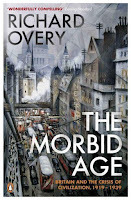 Subtitled "Britain and the Crisis of Civilisation, 1919-1939", this is a dense and detailed history of the interwar period focused largely on its big ideas - capitalism, fascism and socialism, eugenics, psychoanalysis, pacifism etc. Overy's argument is that,
Subtitled "Britain and the Crisis of Civilisation, 1919-1939", this is a dense and detailed history of the interwar period focused largely on its big ideas - capitalism, fascism and socialism, eugenics, psychoanalysis, pacifism etc. Overy's argument is that,"Ideas do not operate in a social vacuum. Much of what follows explores the many ways in which ideas were communicated and how extensively, socially and geographically. The discourse did not remain the preserve of an isolated cultural elite but flourished in the first real age of mass communication." (p. 5)
He lists the uptake of radio licenses, the sales of cheap paperbacks, the wide variety of lectures and summer schools, even the instructional films on frank subjects (ie sex).
"British society had a thirst for knowledge and a mania for voluntary associations willing to supply it. The state played a part in this process by developing more sophisticated statistical measurement and applying this to areas of policy or by identifying areas of key public concern which the government could review. The government enquiries on the trade in arms, on sterilisation policy, mental defect, population development and the depressed areas supplied ammunition for the public debates on social degeneration, economic crisis and war." (p. 375)
Historical incidents are used to show how people took or shifted positions. There's nothing on the "Spanish" flu and little on the Wall Street Crash, presumably because they didn't challenge people's previously held views. But there's lots on how the Spanish Civil War challenged the large and well-organised pacifist cause. For example, Overy quotes Julian Bell, nephew of Virginia Woolf, in a letter from 1937 to EM Forster as Bell made his way to fight - and die - in Spain:
"At this moment, to be anti-war means to submit to fascism [and] to be anti-fascist means to be prepared for war." (p. 339, in a section quoting from PN Furbank's EM Forster: A Life (London, 1977), pp. 223-4, and Mepham's Virginia Woolf, pp. 168-9.)
Overy details the impact that this and Bell's death had on this literary circle, many of whom initially held to their prior anti-war convictions. This then dovetails with the Prime Minister's efforts to avoid conflict with Hitler, and the gradual shift in public attitudes in the lead up to the Second World War.
"The most remarkable convert was the pacifist philosopher Cyril Joad, whose absolute renunciation of war was reiterated publicly right up to its outbreak and beyond. After wrestling with his convictions for some months in 1940 he experienced a dramatic change of heart. Writing in the Evening Standard in August 1940 under the headline 'I Was a Life-long Pacifist, but Hitler Changed my Mind', Joad explained that the things he valued about England - 'the free mind and the compassionate heart, the love of truth ... of respect for human personality' - were absolutely endangered by a Hitler victory which would usher in a Dark Age." (p. 352)
[Note to self: this is, broadly, the same kind of shift embodied in Alydon the Thal in the first Doctor Who story to feature the Daleks.]
What really struck me is the fatalism in all this: the widespread sense that while it might have been necessary to go to war with Hitler, such conflict would more likely end than save civilisation. That sentiment, I think, haunts The Lord of the Rings (I've been listened to the BBC radio version recently, more of which anon). It adds something to what I've been told about my grandparents' hastily arranged weddings (in September 1939 and 1940 respectively). It permeates into the book I'm writing now on David Whitaker, and his fatalistic view that history cannot be changed and we are simply swept along in its course. Yes, an idea to shift the ground beneath me.
Overy opens the book with the recollection of a telling conversation with the historian Eric Hobsbawm in which,
"he told me that he could remember a day in Cambridge in early 1939 when he and some friends discussed their sudden realization that very soon they might all of them be dead. This did strike me as surprising, and it runs against the drift of the [Hobsbawm] memoirs, in which he argued that communists were less infected by pessimism than everyone else because of their own confidence in the future." (p. xiii)
Even the faithful shared - if just on one day - that sense of foreboding. But then they were swept on.
February 5, 2023
The Life of Crime, by Martin Edwards
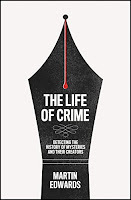 This massive history of crime fiction and its creators, from William Godwin to PD James, is brilliant, rich and absorbing. It's especially clever to not spoil any of the many, many great-sounding mysteries, effectively adding a thousand new volumes to the things I'm eager to read. Chapters group stories by theme, making insightful connections while also telling the history of the genre more or less in chronological order.
This massive history of crime fiction and its creators, from William Godwin to PD James, is brilliant, rich and absorbing. It's especially clever to not spoil any of the many, many great-sounding mysteries, effectively adding a thousand new volumes to the things I'm eager to read. Chapters group stories by theme, making insightful connections while also telling the history of the genre more or less in chronological order. Along the way, it's packed with extraordinary real life. How amazing to learn, for example, that Patricia Highsmith, whose Plotting and Writing Suspense Fiction (1983) I so admire, had a passion for snails.
"After leaving England, Highsmith moved to continental Europe, but crossing international borders with her pets presented a serious challenge. She rose to it, as she explained to her American editor, by smuggling her snails in her bra, six to ten a breast, he reported: 'That just wasn't on the one trip - no, she kept going back and forth ... And she wasn't joking - she was very serious.'" (p. 411, editor Larry Ashmead quoted from Andrew Wilson's biography, Beautiful Shadow: A Life of Patricia Highsmith (2009))
Or there's the six well-known crime writers - Anthony Berkeley, Dorothy L Sayers, Agatha Christie, Hugh Walpole, EC Bentley and Father Ronald Knox - who wrote an episode each of Behind the Screen for BBC Radio in 1930, the audience at home challenged to solve the mystery as it unfolded over six instalments, aided by each episode also being published in The Listener the same week as broadcast. However, Walpole, responsible for writing and reading the first episode, wanted to be spontaneous and insisted on reading from notes.
"So Hilda Matheson, in charge of the [BBC] Talks Department, arranged for two parliamentary reporters to take down his words [during the Saturday-evening broadcast], and type them up on the Sunday morning, so that she or [producer Howard] Marshall could check the transcript that afternoon, and post the corrected version to the printers so that they had it at half past seven on Monday morning. Even then, publication of The Listener was delayed." (p. 260)
Hooray for Hansard, and for quick, efficient postal service even on a Sunday night!
Then there's Val Gielgud, BBC director and brother of John, whose,
"exotic lifestyle - he married five times, and often wore a cloak and carried a sword-cane - was certainly a gift for the gossip columnists." (p. 261)
What an image! This was in the 1930s; Edwards is talking about Gielgud's radio version of Rope and his collaboration, with BBC colleague Eric Maschwitz, on Death at Broadcasting House (1934). But it conjured in my head a vision more like the '60s, all Avengers and Adam Adamant. And that's what this book is so often about - writers and contributors who pushed the genre forward, who were ahead of their time.
The serious and thorough history is peppered with this odd, enthralling stuff, but Edwards also has a wry line in humour, such as describing the premiere at Carnegie Hall on 10 April 1927 of Ballet Mecanique by George Antheil.
"Unfortunately, everything that could go wrong on the night did go wrong. There weren't even any riots." (p. 200)
His enthusiasm is also infectious, such as his wholly understandable awe in describing the novel The Living and the Dead (1994) by Awasaka Tsumao, a pseudonym of illusionist Masao Atsukawa. The book was published with its signatures uncut so that only 24 of the 215 pages could initially be read - basically every eighth verso and recto, if I've got my sums right. The title page then gives instructions on,
"HOW TO READ THIS BOOK: First of all, please read the book with the sealed binding. You'll read a short story. Next, cut each page and enjoy a full-length novel. The short story has disappeared. (signed) The Author. The Disappearing Short Story." (pp. 541-2)
Edwards tells us that,
"The short story involves a small group of people at a bar, one of whom is a sad young man who seems to have psychic abilities. But when the pages are cut, that character disappears. There's at least one gender switch, the setting becomes a magic club rather than a bar, and Yogi Gandhi (who doesn't appear in the short story) is the hero. The magic only works because of the nature of the Japanese language. It would be impossible to translate while maintaining the effect. It also can only work in a print version." (p. 542, and based on the author's discussions with Steve Steinbock)
Like Edwards, I'm now haunted by this outrageously ingenious artefact, and keep turning over how it might be restaged in English. A book to haunt a writer's dreams.
All in all, it's a fascinating and detailed history, and also a rich source of inspiration. It covers an enormous range of material and themes. If I'm being nitpicky and selfish, I'd have liked more on the overlaps between the detective story and science-fiction, if only because that's continually churning through my head - see my thread on science-fiction and Sherlock Holmes. Edwards makes four references to Isaac Asimov, whose The Caves of Steel (1954) features a robot detective, but three of these references are in end notes, only one in the main body of text. Really, I just want him to recommend me more in that vein.
And then there's the devastating statement on the fundamental paradox of genre, taken from Janwillem van de Wetering's Robert van Gulik: His Life His Work (1987)...
"The true artist yearns to grow and move forward. The general public has an insatiable appetite for more of the same." (p. 500)
More:
My Sherlock Holmes novel, The Great WarMy locked-room Doctor Who stories Home Truths and, er, The Locked RoomFebruary 2, 2023
Doctor Who Magazine #587
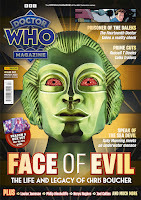 The new issue of Doctor Who Magazine features another "Sufficient Data" infographic from me and Ben Morris, this time with a Valentine's Day theme.
The new issue of Doctor Who Magazine features another "Sufficient Data" infographic from me and Ben Morris, this time with a Valentine's Day theme.
January 27, 2023
Body Parts - Essays on Life-Writing, by Hermione Lee
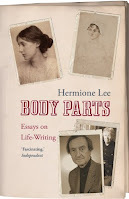 Having so admired Hermione Lee's biography of Penelope Fitzgerald, I was keen to hear - and thieve from - her insights more generally on the business of writing someone else's life. This collection of essays on the subject is, like her Fitzgerald book, full of illuminating, wry observation.
Having so admired Hermione Lee's biography of Penelope Fitzgerald, I was keen to hear - and thieve from - her insights more generally on the business of writing someone else's life. This collection of essays on the subject is, like her Fitzgerald book, full of illuminating, wry observation.How brilliant, for example, to note Angela Thirkell's "blithe lack of sexual awareness" by quoting from a scene in The Brandons (1939) in which characters at a village fete take a ride on a merry-go-round made of wooden animals:
"'I knew it was you on the ostrich,' she [Lydia] said to Delia ... 'I say, someone's on my cock.'
'It's only my cousin Hilary,' said Delia. 'He won't mind changing, will you, Hilary...'
Mr Grant, really quite glad of an excuse to dismount, offered his cock to Lydia, who immediately flung a leg over it, explaining that she had put on a frock with pleats on purpose, as she always felt sick if she rode sideways...
... 'I know that once Lydia is on her cock nothing will get her off. I came here last year ... and she had thirteen rides." (Lee, p. 180, quoting Thirkell pp. 260-2)
This is all the more extraordinary when Lee then tells us that Thirkell was the mother of Colin Macinnes, author of Absolute Beginners (1959) and other bold works exploring sexuality and decadence. As a result, the quoted passage becomes something else, indicative of the clash between mother and son.
Lee quotes juicy bits from a number of other biographies, and like her I'm drawn to what she calls the "brutal, funny and helpful" advice given by the writer Colette to actress Marguerite Moreno:
"You lose most of your expressiveness when you write... Stick in a description of the decor, the guests, even the food... And try, oh my darling, to conceal from us that it bores the shit out of you to write." (Lee, p. 117, quoting Judith Thurman's Secrets of the Flesh - A life of Collete (1999), p. 543)
Or there's the way she explains the shock that met Ellen Glasgow in the 1930s writing stories about degeneration, extramarital love and scientific arguments against religion etc, then quotes one of Glasgow's characters - "failed philosopher, John Fincastle" - to get a sense of the impact on the author's own career.
"Nobody could earn a livelihood in America by thinking the wrong thoughts." (Lee, p. 124, quoting Glasgow's Vein of Iron (1935), p. 38)
Body Parts is peppered with this stuff. Even the briefest reference to Jane Porter's 1803 novel Thaddeus of Warsaw (p. 125) ignited my interest, prompting additional reading and connections - and perhaps a new project to lose myself in...
But what about things I'm writing now? Two essays in this collection, "Virginia Woolf's nose" at the start and "How to End It All" at the conclusion, address the ways that accounts of a person's death are often written to cast light or reflection on the life as a whole. Imagining the subject looking back over their lives is a a conceit, imposing neatness on what can be untidy ends. In fact it's not just death: lives are often untidy and inconsistent, and Lee is good on exploring that - how to address contradictory or outlier evidence, or the way a theory about someone's life can be repeated by biographers until it takes on the authority of "fact". Lee says,
"this process of cumulative reiteration happens all the time" (p. 135)
I'm mindful of that as I write my biography of David Whitaker - and also my book on his 1964 Doctor Who story, The Edge of Destruction, where I can see such reiteration in the "facts" about early Doctor Who. I'm not sure Lee provides answers to the knotty questions that she raises about how we go about telling a story without fictionalising real life - but I think that's the point. There is plenty to think about; she directs us towards the things to worry at.
January 21, 2023
The Distant Echo, by Val McDermid
 A young woman attacked and left for dead is found by four young students on their way home from a party. When she dies, suspicion falls on these four lads, and haunts them for the next 25 years...
A young woman attacked and left for dead is found by four young students on their way home from a party. When she dies, suspicion falls on these four lads, and haunts them for the next 25 years...For a long time I couldn't really stomach murder mysteries, real life too choker with its own mundane horror to take on any more. But my mum recommended this, the first to feature Karen Pirie who now has her own TV show, so I gave it a go. It's compulsive reading, full of real life and human frailty, and though I'd solved the case long before the end that only added to the mounting tension.
In fact, lots of it is very tense. For several nights I dreamt of the simple, awful horror of a man being dropped down a well. There's lots of pain, physical and mental, that really hurts.
It's odd, given the TV series, that Karen Pirie has so little to do, even when present with evidence. She's a minor character here, not in the first half at all. I'm curious to see what happens next to make her the lead.
That one character's odd, even criminal behaviour is apparently down to him having been adopted is... well, I've read other stuff from the same period that takes a similar line. It's a bit crass. And the book concludes with a chapter in which two characters talk through all the outstanding plot threads, which isn't the most elegant way to finish what's otherwise been done so deftly.
Simon Guerrier's Blog
- Simon Guerrier's profile
- 60 followers



